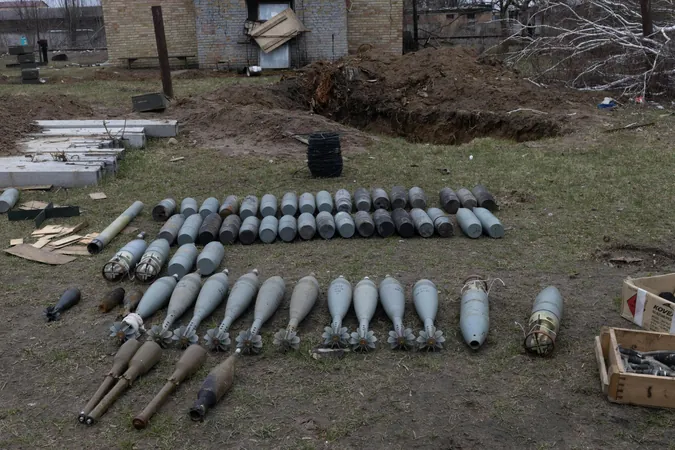
Explosive Risks: Army Bomb Disposal Veterans Face Alarming Bladder Cancer Rates
2025-03-26
Author: Ming
Introduction
In a startling revelation, a recent study has uncovered that Army bomb disposal veterans face a significantly heightened risk of developing bladder cancer compared to the general population. Published in the esteemed medical journal BJU International and presented at the European Association of Urology Annual Congress in Madrid, the findings highlight an alarming trend that could affect thousands of former service members.
Research Overview
The research, conducted by a collaboration of experts from the University of Wales Trinity Saint David, University of Birmingham, King’s College London, University of Glasgow, and South Wales NHS Trust, found that British Army veteran bomb disposal officers under the age of 70 may be five times more likely to develop bladder cancer than civilians. This urgent discovery raises serious concerns about the long-term effects of hazardous occupational exposures faced by these brave individuals during their careers in Explosive Ordnance Disposal (EOD).
Expert Insights
Dr. Gareth Collett CBE, the lead author of the study and a retired Brigadier who formerly headed UK bomb disposal, expressed the study's intentions, emphasizing the need for awareness rather than blame. “Our research aims to protect current servicemen and women while advocating for those who have survived and those still at risk. Recognizing the link between exposure to specific explosives and bladder cancer could pave the way for life-saving changes in policies and procedures,” he remarked.
Study Limitations and Urgency for Further Research
While the initial study's sample size was relatively small—drawing responses from about 30% (688 out of 2,300) of veterans who have served in EOD since 1970—co-author Professor Rik Bryan, Director of the Bladder Cancer Research Center, underscored the strong implications of the findings. He urged for more comprehensive studies to better understand the risks these personnel face. “We need to cast a sharper focus on those exposed to hazardous materials, as early detection could make a life-saving difference,” he stated.
Bladder Cancer Overview
Bladder cancer is the sixth most common cancer in the UK, typically evading quick diagnosis due to its symptoms often mimicking those of less serious conditions. Often characterized by blood in the urine, it can also present as urinary changes and irritation. The misconceptions surrounding these symptoms further complicate the early detection of this potentially deadly disease.
Personal Experience of Dr. Gareth Collett
Dr. Collett's urge to action was provoked by his own shocking diagnosis of bladder cancer in November 2023, leading him to share his experience on social media. This sparked similar reports from fellow veterans, prompting an urgent investigation into the prevalence of the disease among those who have served in bomb disposal roles.
Call for Improved Health Policies
Implications for veteran health extend beyond personal anecdotes. There is a pressing need for health policies to evolve, reflecting the potential dangers faced by our military members. The study suggests a clear link between the disposal of munitions containing nitro-explosives, such as TNT, and an increase in bladder cancer cases. Historically, the heightened cancer risk has been attributed to exposure in industries like tire manufacturing and chemical processing, but this study marks a potential groundbreaking discovery linking this risk to military service.
Need for Action and Awareness
As more veterans are being diagnosed, there is an urgent call for improved screening protocols and preventive measures. Veteran service organizations have already initiated self-help resources for early detection, which could prove crucial in saving lives.
Conclusion
The call to action is clear: greater awareness among healthcare professionals regarding this risk among veterans is essential. With the already alarming findings and the steady rise in diagnoses, it’s crucial for the military, medical professionals, and policymakers to work together in developing robust screening and supportive measures for those who have served our country. For every veteran facing the aftermath of their service, it’s a lonely walk that should not be undertaken alone.



 Brasil (PT)
Brasil (PT)
 Canada (EN)
Canada (EN)
 Chile (ES)
Chile (ES)
 Česko (CS)
Česko (CS)
 대한민국 (KO)
대한민국 (KO)
 España (ES)
España (ES)
 France (FR)
France (FR)
 Hong Kong (EN)
Hong Kong (EN)
 Italia (IT)
Italia (IT)
 日本 (JA)
日本 (JA)
 Magyarország (HU)
Magyarország (HU)
 Norge (NO)
Norge (NO)
 Polska (PL)
Polska (PL)
 Schweiz (DE)
Schweiz (DE)
 Singapore (EN)
Singapore (EN)
 Sverige (SV)
Sverige (SV)
 Suomi (FI)
Suomi (FI)
 Türkiye (TR)
Türkiye (TR)
 الإمارات العربية المتحدة (AR)
الإمارات العربية المتحدة (AR)